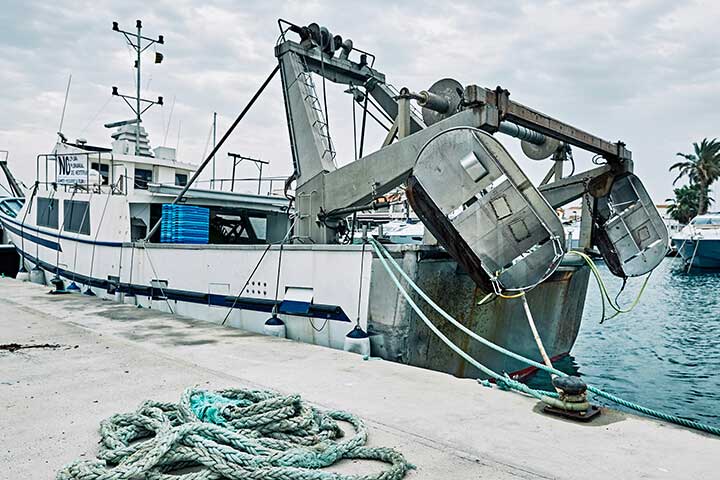
Fishermen of Formentera
Early in 2019, the EU was boasting about a scheme it had designed that would govern fishing in the Western Mediterranean for several years. In the eyes of Europe this was a complete success, as it was the first time an agreement had been achieved within the European Community framework for these waters, whose sovereignty and influence areas are divided between Spain, Italy and France. In principle, the scheme was an attempt to ensure the survival of species by regulating biological recovery periods, reducing the fishing effort (i.e. the days of fishing), establishing fishing objectives for demersal species (deepwater fish), and even limiting trawling at depths greater than 100 m.
Three years have passed, and although the effects of this initiative on populations of marine species remain to be seen, local fishermen in the Balearic Islands feel affronted that they were not taken into account when the legislation was drawn up. That is certainly true of Pepe Pérez, the skipper of the Punta Gavina, a 23 metre-long fishing vessel moored in the port of Formentera, who greets us on his deck with a smile.

His broad grin contrasts with the worried expression in his eyes. He tells us that right now there is an enormous amount of fish because of successive biological recovery periods during recent years, and also because of the reduction in the fishing effort. The greatest impact, however, has been caused by the pandemic, which has kept most of the fleet tied up in port for the past year, with virtually the whole of the tourist and hospitality sector under lockdown.
Local fishermen feel aggrieved
At the age of 32, Pepe has spent half his life at sea, just like his brothers. They are traditional fishermen, a vanishing species. In their view, the regulations are unfair in that they place them at a disadvantage in relation to the great multinational fishing vessels whose licences are obtained “in Madrid”, and whose nets are set at night, “when there are fewer controls, and they then wipe out the amberjack and squid populations”, adding “when we’re setting out at dawn, they’re returning to port”.
Paradoxically, the European Community regulations that aim to ensure the sustainability of fishing appears to be endangering traditional fishing, the most sustainable of all. Small, local fishermen feel that they have been wronged by rules drawn up in offices thousands of kilometres away from their fishing grounds by people who seem to be unaware of the particular characteristics of the traditional fishing industry, and who are making it compete on equal terms (or, rather, on unequal terms) with the major fishing vessels.
They cite, for example, the regulation on fishing depth that forces them to fish in deeper waters in order to avoid obstructing the fishing of other species — in other words, to ensure their trawl nets do not pull on octopus fishing gear or other fishing lines, thereby interfering with the fishing of octopus, prawns or lobster. “But here we can’t catch octopus or anything else”, he exclaims despairingly, “and if anyone is fishing for lobster, we respect that: I’m not going to pull up their nets. There’s enough sea for us all to fish in!.”

Scorpionfish
As far as the so-called fishing effort is concerned, since 2018 the number of days when fishing is permitted has been reduced by 28. This year there will be 155 permitted days, and for 2022 and 2023 the number of days is set at 140 and 130 respectively. There are those who believe that it will not stop there, and that the days when fishing is allowed will continue to decline. “Eventually we’ll have to sell or abandon the boat!”, Pepe declares bitterly.
As far as the biological recovery periods are concerned, the law allows for compensation for those who fish the affected species. However, Pepe tells us that the Government is behind with the payments. “They’ve just paid the compensation for three years ago... They don’t realise what we have to pay out, the insurance for the boat, the social insurance payments...”, he complains.
It’s not all bad news, however. It seems that the Government has finally taken heed of an old demand by professional fishermen, and has published a bill for a new Royal Decree to regulate recreational fishing. This has caused a stir among fishing enthusiasts because of the tight restrictions it imposes in regard to the amount of fish and the species that may be caught. Pepe has a blunt response to all this: “If we professionals have to account for all our catches, then I don’t see why the recreational fishermen shouldn’t too. Especially if it’s being done to check the state of fish stocks. And, he adds proudly, “at the end of the day we can all co-exist, but we’d like a bit of respect for the job we do”.






